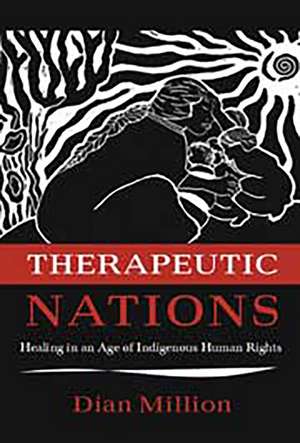Therapeutic Nations: Healing in an Age of Indigenous Human Rights: Critical Issues in Indigenous Studies
Autor Dian Millionen Limba Engleză Paperback – 18 oct 2014
Self-determination is on the agenda of Indigenous peoples all over the world. This analysis by an Indigenous feminist scholar challenges the United Nations–based human rights agendas and colonial theory that until now have shaped Indigenous models of self-determination. Gender inequality and gender violence, Dian Million argues, are critically important elements in the process of self-determination.
Million contends that nation-state relations are influenced by a theory of trauma ascendant with the rise of neoliberalism. Such use of trauma theory regarding human rights corresponds to a therapeutic narrative by Western governments negotiating with Indigenous nations as they seek self-determination.
Focusing on Canada and drawing comparisons with the United States and Australia, Million brings a genealogical understanding of trauma against a historical filter. Illustrating how Indigenous people are positioned differently in Canada, Australia, and the United States in their articulation of trauma, the author particularly addresses the violence against women as a language within a greater politic. The book introduces an Indigenous feminist critique of this violence against the medicalized framework of addressing trauma and looks to the larger goals of decolonization. Noting the influence of humanitarian psychiatry, Million goes on to confront the implications of simply dismissing Indigenous healing and storytelling traditions.
Therapeutic Nations is the first book to demonstrate affect and trauma’s wide-ranging historical origins in an Indigenous setting, offering insights into community healing programs. The author’s theoretical sophistication and original research make the book relevant across a range of disciplines as it challenges key concepts of American Indian and Indigenous studies.
Million contends that nation-state relations are influenced by a theory of trauma ascendant with the rise of neoliberalism. Such use of trauma theory regarding human rights corresponds to a therapeutic narrative by Western governments negotiating with Indigenous nations as they seek self-determination.
Focusing on Canada and drawing comparisons with the United States and Australia, Million brings a genealogical understanding of trauma against a historical filter. Illustrating how Indigenous people are positioned differently in Canada, Australia, and the United States in their articulation of trauma, the author particularly addresses the violence against women as a language within a greater politic. The book introduces an Indigenous feminist critique of this violence against the medicalized framework of addressing trauma and looks to the larger goals of decolonization. Noting the influence of humanitarian psychiatry, Million goes on to confront the implications of simply dismissing Indigenous healing and storytelling traditions.
Therapeutic Nations is the first book to demonstrate affect and trauma’s wide-ranging historical origins in an Indigenous setting, offering insights into community healing programs. The author’s theoretical sophistication and original research make the book relevant across a range of disciplines as it challenges key concepts of American Indian and Indigenous studies.
Preț: 242.05 lei
Nou
Puncte Express: 363
Preț estimativ în valută:
46.32€ • 49.53$ • 38.62£
46.32€ • 49.53$ • 38.62£
Carte disponibilă
Livrare economică 24-31 martie
Livrare express 13-19 martie pentru 32.47 lei
Preluare comenzi: 021 569.72.76
Specificații
ISBN-13: 9780816531417
ISBN-10: 0816531412
Pagini: 240
Dimensiuni: 152 x 229 x 18 mm
Greutate: 0.33 kg
Ediția:First Edition
Editura: University of Arizona Press
Colecția University of Arizona Press
Seria Critical Issues in Indigenous Studies
ISBN-10: 0816531412
Pagini: 240
Dimensiuni: 152 x 229 x 18 mm
Greutate: 0.33 kg
Ediția:First Edition
Editura: University of Arizona Press
Colecția University of Arizona Press
Seria Critical Issues in Indigenous Studies
Notă biografică
Dian Million (Athabascan) is an associate professor of American Indian studies at the University of Washington. The recipient of a Fulbright Fellowship, Million has conducted research in Canada and the United States.
Recenzii
“Million effortlessly puts the theories produced by Native healing and organizing projects into conversation with theorists across diverse fields. This book is simply brilliant.”—Andrea Smith, author of Native Americans and the Christian Right: The Gendered Politics of Unlikely Alliances
“Million’s determination to address dangers on both sides, to avoid binaristic traps, and her care not to dismiss the routes she critiques, require a sophistication and a nimbleness that she is able to supply.”—Jennifer Henderson, author of Settler Feminism and Race Making in Canada
“Million documents how Indigenous appropriation of the language of trauma shifted public discourse away from blaming the deviance of anomic Indians to recognizing Indigenous children and adults as victims of sexual violence and Canada’s neocolonialism more broadly.”—International Journal of Transitional Justice
Descriere
Therapeutic Nations is one of the first books to demonstrate trauma's wide-ranging historical origins, and it offers a new indigenous feminist critique of the conversation of healing. Million's theoretical sophistication and original research make the book relevant across a range of disciplines as it challenges key concepts of American Indian and indigenous studies.











